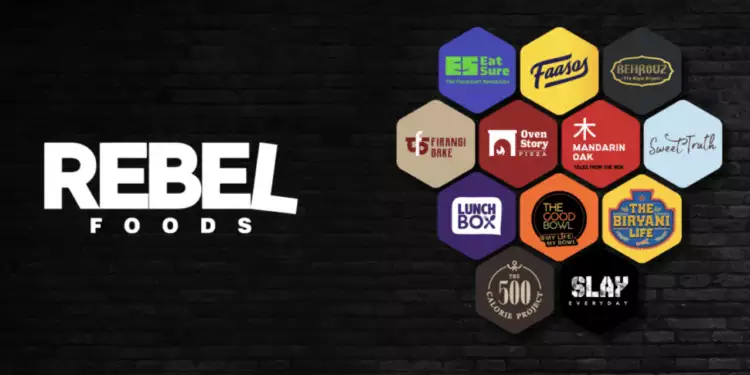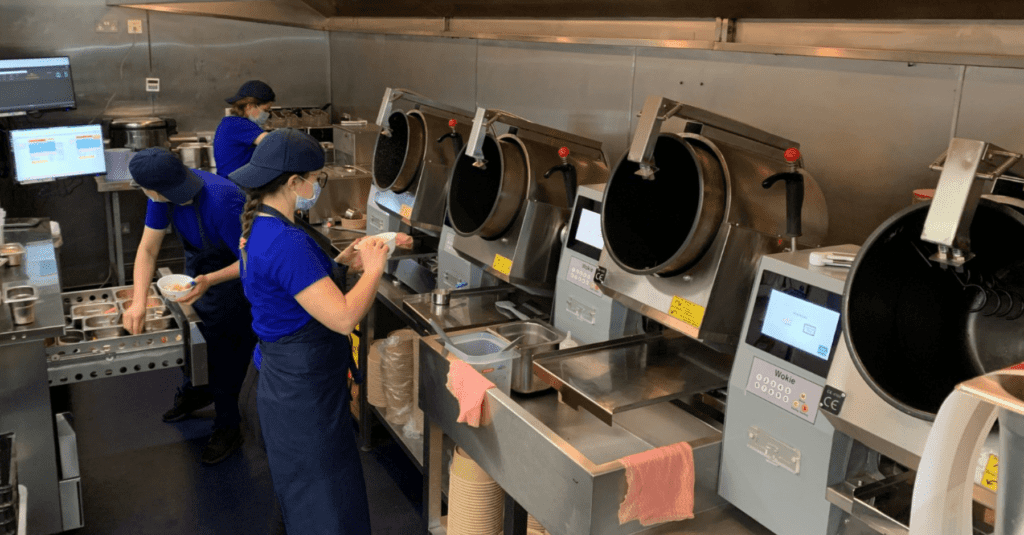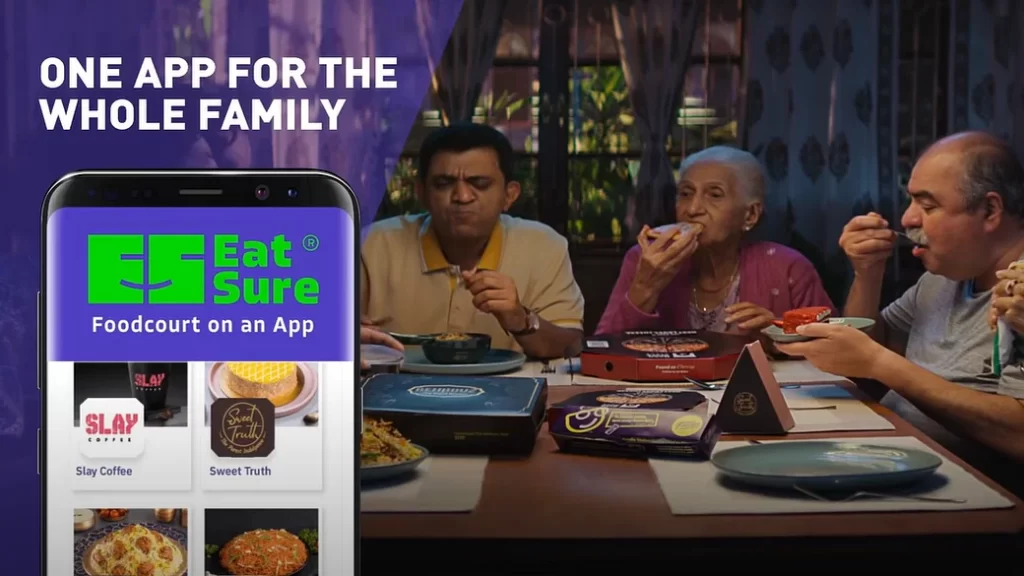As the food and restaurant industry experienced a shift towards digitalization after the COVID-19 lockdown, the need for innovation grew. When Kallol Banerjee and Jaydeep Barman set up Faasos in 2011, they were aiming to be the next McDonalds. They didn’t know back then that their humble wrap business would skyrocket into an international network of cloud kitchens; making them the largest cloud kitchen chain in the world. Today, Rebel Foods operates more than 450 kitchens in 10 countries with its innovative and tech-based operating system.
The internet-based cloud or ‘ghost’ kitchen chain has propelled Rebel Foods into its unicorn journey. Yet, this wasn’t what the founders expected when they started it. Banerjee and Barman set up a high-street quick-service restaurant (QSR) chain selling wraps, but the traditional QSR model proved capital-intensive and difficult to scale. Even the introduction of pizza to the menu to add a novelty of choices did not work as profitably as they hoped.
The true game-changing shift came to the duo through changing the Faasos business model from QSR to a ghost kitchen with online delivery. The rebranding from Faasos to Rebel Foods allowed them to venture into multiple cuisines and specialisations. In a kitchen carried by AI, a strong team, and tech-based cooking machinery, they could branch out multiple chains from a single operating system. But how did this booming cloud kitchen business come to be?
Humble start to a rapid ascent – Where it all began
The pioneers of the largest internet restaurant in the world are sure to be foodies themselves. Needless to say, Jaydeep Barman came from a family steeped in the food industry. His passion for food and entrepreneurship led him to aim for an innovative and impactful approach to the food business. After pursuing his MBA from INSEAD in France, Barman noticed the lack of an Indian global food chain despite the popularity of Indian cuisines worldwide.

In 2011, Barman met up with his friend and colleague from IIM Lucknow, Kallol Banerjee. They banked on the traditional and unbeatable flavour of a Kathi roll and collectively decided to launch a food chain focused on rolls, which they named Faasos. While the chain enjoyed considerable success, its prospects turned bleak in 2014. The capital-intensive QSR model, lack of high-street locations, and growing competition played a major role.
The stroke of luck came from the realisation of simple logic. Due to the presence of industry giants like Zomato and Swiggy, cloud kitchens with one cuisine were unlikely to gain momentum. Every successful brand focused on a specific cuisine, and if they wanted to tap into multiple food palettes, branching into multiple cuisines was necessary. With this intention, the duo rebranded their previously failing pizza venture as Ovenstory.
In 2015, the duo closed Faasos’ physical location and ventured completely into the cloud kitchen model. From 2016 onwards, Fasoos became a sub-brand of the group, and the company was renamed Rebel Foods. The company expanded its operations from Pune to Mumbai, Bangalore, and Hyderabad. Generating an annual revenue of Rs. 66.21 crore in 2016.
A single kitchen for all your cravings
Moving on from the loveable Kathi rolls and go-to pizza options, the company soon rolled into the unbeatable Biryani segment. In 2016, they set up Behrouz Biryani, which soon became a household name, with Rebel Foods delivering almost 2 lakh biryani packets a month.
The success of Behrouz Biryani legitimised the cloud kitchen business further, and soon the company was branching into a plethora of cuisines, answering to every craving a customer could have. They introduced Mandarin Oak for Chinese cuisine, Sweet Truth for desserts, and Biryani Life for affordable and single-serve biryani options. Currently, the franchise operates over 45 owned and partner brands like The Good Bowl, Slay Coffee, LunchBox, and much more.

“A business like ours can solve different customer missions. So lunch on a weekday is a very different ‘mission’ from ordering food on Sunday while watching the India-Pakistan match. We crave different meals and cuisines at different times of the week. At Rebel, all of those needs of a single customer are fulfilled in one kitchen,” said Rebel Foods co-founder Kallol Banerjee.
Realising the benefits of the ghost kitchen system, the startup introduced its partnership with India-based restaurants to assist them with their ghost kitchen operations and launched the Rebel Launcher Programme in 2018. The company plays a major role in the growth of cloud kitchens across India; some of its partners include Naturals, Mad Over Donuts, Holy Cow, Zomoz, and US chain Wendy’s. In 2019, realising the impact of food delivery services like Zomato and Swiggy, Rebel Foods launched Eatsure. This introduced a consolidated food delivery service for Rebel Foods’ brands and partner chains.
An innovative kitchen
As the business expands, efficiency does too. To automate the culinary processes behind its brands, the company focused on process innovations and machines that allowed it to run multiple brands from the same kitchen. Rebel Foods developed most of its systems, applications, and algorithms in-house. The tech platform developed by the company’s engineers and managers allowed it to work with flexibility and speed. The innovations controlled queuing, batching, and inventory prediction. Additionally, its data-science model streamlined its food recommendation model for its customers.
“We started with making food and still do that. But because today we have the advantages of growing revenue, a scalable business model, and venture capital money, we are deploying technology to streamline our food-making processes and reduce the inefficiencies,” said Banerjee.

This innovative turn helps Rebel Foods’ chefs hone their culinary skills and make world-class dishes. This helped them launch 280 different dishes across their brands between 2016 and 2018. Rebel Foods is using modern technology, including computer vision and AI, to automate the cooking process in its kitchens. This is done using intelligent equipment such as robotic woks, dum machines, automated tavas, and auto fryers. The machinery mimics the rotation of a wok or dum, previously only possible by hand, and even instructs chefs on the addition of certain ingredients based on recipes.
The automation also allows the woks to dispense the required amount of oil and control the temperature. The screen on the automated woks instructs the chefs. Such a system ensures that the burden of a high-demand business like Rebel Foods doesn’t weigh down its workers. Through keeping track of the entire cooking operation, the AI machines also ensure that there’s minimal food waste.
Steady traction despite competition
Rebel Foods’ expenses are primarily driven by the cost of food, employee benefits, advertising, and promotions. The company has also been investing heavily in expanding its cloud kitchen network and launching new brands. It operates over 450 cloud kitchens in 75 cities in India, Indonesia, the United Arab Emirates, the United Kingdom, Singapore, Malaysia, Thailand, Bangladesh, Hong Kong, and the Philippines.
In fiscal 2020, Rebel Foods’ annual revenues grew to ₹561 crore, an 83% increase compared to the previous year. In 2021, it obtained a $175 million Series F funding round backed by the Qatar Investment Authority, Sequoia Capital India, and Goldman Sachs. After the investment, the startup’s valuation skyrocketed to $1.4 billion, making it a unicorn. Despite its steady rise in revenue, the brand also suffered losses. Its expenses increased by 86% and amounted to Rs 1,429 crore.

While Rebel Foods’ business is dependent on sales, aggregator platforms like Zomato and Swiggy come up as strong competitors. Though Rebel Foods operates its own delivery platform, it still receives most of its orders from the aforementioned platforms. The brand also competes with brands like Singapore-based Grab and Indonesia-based Gojek. Still, the owners believe that this monopoly from Swiggy and Zomato won’t last long; as they don’t make the food they sell and mostly work through partners. This promises an optimistic future for Rebel Foods.
“Innovations such as the customer being able to see their food being cooked through the app, maybe even talk to the chef, are waiting to happen. Zomato/Swiggy would never do that because they don’t make the food. Such personalisation, along with other tested features such as loyalty points leading to better prices for the customer, can help create an additional revenue stream for food businesses,” the founders commented.

